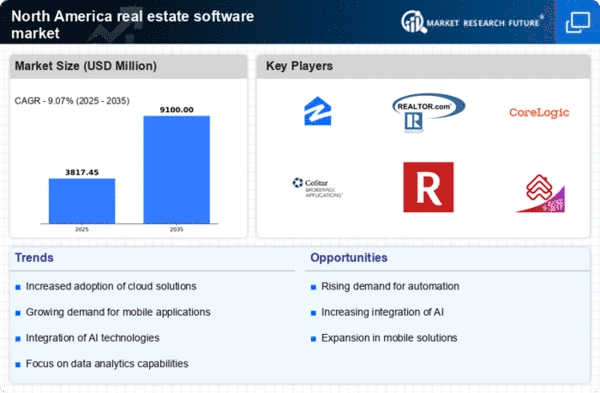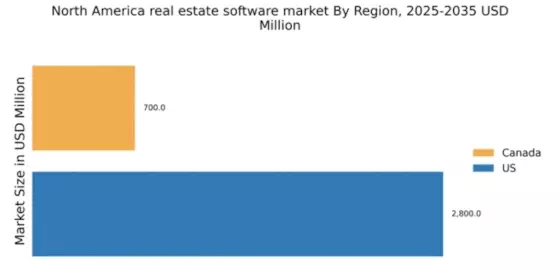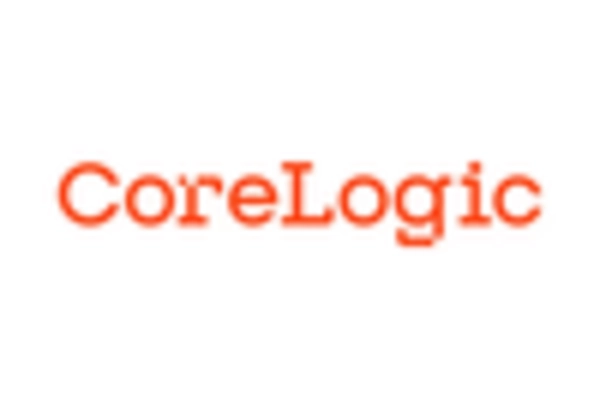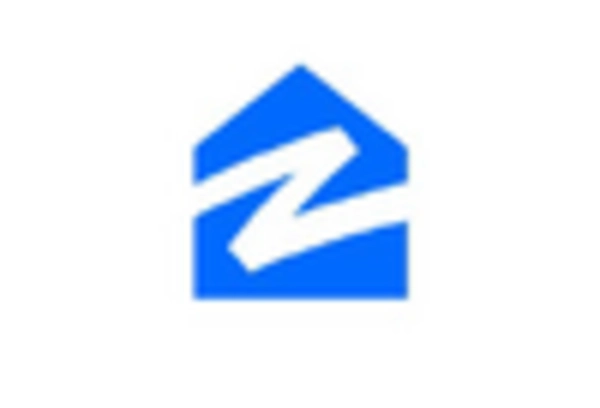Growing Focus on Customer Experience
The emphasis on enhancing customer experience is a significant driver for the real estate-software market in North America. Real estate companies are increasingly recognizing the importance of providing exceptional service to attract and retain clients. This focus is leading to the development of software solutions that facilitate personalized interactions, streamline processes, and improve overall client satisfaction. According to industry reports, companies that prioritize customer experience see a 60% increase in client retention rates. As a result, the real estate-software market is likely to expand as businesses invest in technologies that enhance the customer journey.
Technological Advancements in Real Estate
The real estate-software market in North America is experiencing a surge due to rapid technological advancements. Innovations such as virtual reality (VR) and augmented reality (AR) are transforming property viewing experiences, allowing potential buyers to explore properties remotely. Furthermore, the integration of advanced analytics tools enables real estate professionals to make data-driven decisions, enhancing operational efficiency. According to recent data, the market for VR in real estate is projected to grow at a CAGR of 30% through 2026. This trend indicates a strong demand for software solutions that can incorporate these technologies, thereby driving growth in the real estate-software market.
Increased Demand for Remote Work Solutions
The shift towards remote work has significantly influenced the real estate-software market in North America. As companies adapt to flexible work arrangements, there is a growing need for software that facilitates virtual collaboration and property management. Tools that enable remote communication, project management, and digital document sharing are becoming essential for real estate professionals. This demand is reflected in the market, where software solutions that support remote operations are expected to see a growth rate of 25% over the next few years. Consequently, the real estate-software market is likely to expand as businesses seek to enhance their operational capabilities.
Rising Investment in Smart Home Technologies
The increasing investment in smart home technologies is a key driver for the real estate-software market in North America. Homebuyers are increasingly seeking properties equipped with smart devices that enhance convenience and energy efficiency. This trend is prompting real estate developers to integrate smart technologies into their offerings, thereby creating a demand for software that can manage these systems. The smart home market is projected to reach $174 billion by 2025, indicating a substantial opportunity for software solutions that cater to this growing sector. As a result, the real estate-software market is likely to benefit from this trend as it aligns with consumer preferences.
Regulatory Changes and Compliance Requirements
The real estate-software market in North America is also influenced by evolving regulatory changes and compliance requirements. As governments implement stricter regulations regarding data privacy and property transactions, real estate professionals are compelled to adopt software solutions that ensure compliance. This necessity is driving demand for software that can manage regulatory requirements effectively. For instance, the implementation of the General Data Protection Regulation (GDPR) has prompted many companies to invest in compliance-focused software. The real estate-software market is expected to grow as businesses seek solutions that not only streamline operations but also adhere to legal standards.

















